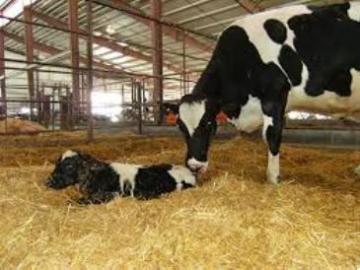
Lesson 6 Calf Management
Calf management includes
- Neonatal calf care (Just after birth).
- Colostrum feeding.
- Housing and environment.
- Weaning.
- Diseases management.
- Vaccinations.
Neonatal calf care (Just after birth)
- Almost 75% mortality happens within first hour of parturition.
- Therefore immediately after the calf is born few tasks must be takes place.
- First access the vital organs of calf to ensure it is alive.
- Check its breathing.
- Heart rate and movement.
- Clear the calf’s air passageway for normal breathing by the help of straw or fingers.
Colostrum feeding
- Calves are borne with few or no antibodies with immature immune system.
- Full immune system develops within five to eight months.
- Due to weak immune system, calves are more susceptible to harmful pathogens and diseases.
- In order to enhance immune system colostrum feeding is important because it contains antibodies.
- Feeding colostrum throughout first 24 hours ideal to ensure they received many immunoglobulins.
Housing and environment
- Stress free environment.
- Physical and behavior comfort.
- Cleanliness should be maintained.
- Should be housed separately to avoid disease transmission.
- Well ventilation.
- Thermal comfort calves should be kept in environment, which is neither too hot nor too cold.
- Feed and water should be easily accessible.
Weaning
- Weaning is a critical point in calf’s life because the amount of stress occurs during this period.
- Weaning is suggested when calf is able to eat one kg of feed daily.
Diseases management
- Due to poor immune system, many diseases may affect calves.
- Diarrhea and scours are most common diseases, which occurs in less than 30 days of age.
- There are few vaccines which preventing diarrhea.
- Immunity from colostrum is most effective to protect calves.
Vaccinations
- Due to calf’s immature immune system, effective vaccination is essential.
- Vaccines are administered intranasal because nasal passage is major pathway for entry of pathogens.
- Different vaccines are given for those diseases that mostly occur in young calves.
Care of Newborn Calf
The golden hour: The first hour after calving is the most critical period in the entire life of new born calf.
IMPORTANT POINTS TO REMEMBER
- Clean nostrils and mouth which helps the calf breathe better and help prevent future breathing problems.
- Allow the mother to lick the calf clean, which promotes circulation within the calf’s body and prepares the calf to stand up and walk.
- Tie the naval cord with a thread at a distance of around 2 inches from the base and cut the remaining cord with a clean instrument.
- Dip the navel (a simple smearing will not serve the purpose) in 7% or higher tincture of iodine solution and repeat after 12 hours. (Do not use teat dip or weaker iodine solutions).
- A poorly maintained navel is the gateway to serious infections.
- A newborn calf should be given 2 liters of colostrum within the first 2 hours of birth and 1-2 liters (based on size) within 12 hours of birth.
- Many calves do not nurse adequate amounts of colostrum from their dams within the first few hours of life, and thus they may not receive adequate immunity.
- Feeding colostrum after 24 hours of birth may not help the calf to ward off infections.
- A calf must receive adequate colostrum to protect it from diseases for the first three months of its life. Colostrum is the calf’s “passport to life”.
- Hand-feeding newborn calves is therefore recommended so that the farmer is sure about the amount of colostrum an individual calf receives.
- De-worming should be done within 10-14 days of age subsequently on a monthly basis up to the 6th month.
- When the animal is 3 months old, contact the veterinarian for vaccination.
- Provide calf starter from 2-8 weeks for better growth and early maturity.
Example of a simple calf starter (approx. percentages)
Maize-52 % ; Oats -20 % ; Soya bean meal -20 %; Molasses -5 %;
Salt -0.5 % ; Minerals (Macro & Micro) -1.5%; Vitamins -1%
Timely care of newborn calf will ensure its survival


